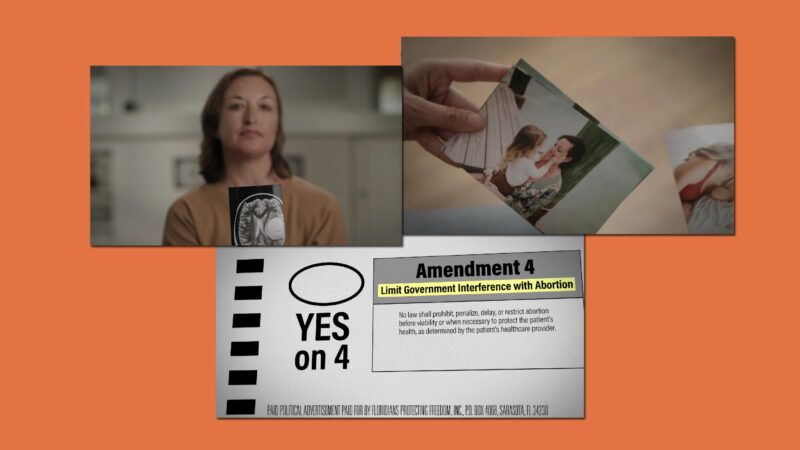Florida Threatens Local TV Station With Prosecution Over 'Dangerous' Pro-Choice Ad
The Florida Department of Health sent a cease and desist order to a Florida news station after it aired an ad claiming that women with cancer would be unable to obtain abortions in the state.

The Florida Department of Health has sent a cease and desist order to a local news station, demanding that it stop airing an advertisement in support of a ballot initiative seeking to overturn Florida's six-week abortion ban.
The ad, produced by the advocacy group Floridians Protecting Freedom, depicts a Tampa woman named Caroline discussing how she was diagnosed with terminal Stage 4 brain cancer while 20 weeks pregnant. In order to start treatment to prolong her life, she needed an abortion.
"The doctors knew that if I did not end my pregnancy, I would lose my baby. I would lose my life. And my daughter would lose her mom," she said. "Florida has now banned abortion even in cases like mine. Amendment 4 is going to protect women like me." Amendment 4, which Floridians will vote on in November, would prohibit Florida from banning abortions before viability, which is typically placed around 24 weeks of pregnancy.
However, the department's letter claims that WCJB, a Gainesville-area news station, cannot legally air the ad because its content is "false" and "dangerous," and therefore subject to Florida law banning "sanitary nuisances" that threaten the "health or lives of individuals."
The department argued that because Florida's abortion law allows for abortions to prevent serious risk of "physical impairment of a major bodily function," Caroline would have, in fact, been able to get an abortion under Florida's law. By suggesting that Florida doctors can't perform abortions in cases like Caroline's, the department contends that the ad could lead women to "foreseeably travel out of state to seek emergency medical care, seek emergency medical care from unlicensed providers in Florida, or not seek emergency medical care at all."
While Florida's six-week ban contains a provision allowing abortions when they are "necessary to save the pregnant woman's life or avert a serious risk of substantial and irreversible physical impairment of a major bodily function of the pregnant woman other than a psychological condition," a doctor included in a response letter sent on behalf of Floridians Protecting Freedom says that she would not have performed Caroline's abortion out of fear of coming under criminal scrutiny. "While the termination was medically necessary because the cancer was terminal, the abortion would not have saved the patient's life and therefore could be illegal under Florida law," the doctor said.
Like in many other states with restrictive abortion laws, how exactly edge cases should be handled by doctors in Florida is a live question. Even if it were clearly true that Caroline would have been able to obtain an abortion under Florida's law, the state can't simply force a broadcaster to take down the ad.
"That speech is squarely protected by the First Amendment, even if, as the state claims, it contains false information. Certain kinds of false speech fall outside the First Amendment's protection, like defamation and fraud. But these are just a few limited, narrowly defined categories of speech," Aaron Terr, director of public advocacy at the Foundation for Individual Rights and Expression, a First Amendment group, told Reason.
"The Supreme Court has been clear that the First Amendment doesn't give the government free-floating power to suppress speech merely based on a judgment that is false or misleading. And as this case shows, government officials would have a strong incentive to abuse that power, to censor speech, opposing them or the policies they support," Terr added.
"The Department cannot criminalize media outlets running political advertisements with which it disagrees," reads Floridians Protecting Freedom's response letter. "Speech criticizing the government in the context of a political campaign is the lifeblood of democracy and lies at the very heart of the First Amendment's protections. The Department's letter is a flagrant abuse of power, and it should be rejected out of hand."
As it turns out, the Federal Communications Commission (FCC) agrees.
"The right of broadcasters to speak freely is rooted in the First Amendment," FCC Chair Jessica Rosenworcel said in a statement on Tuesday. "Threats against broadcast stations for airing content that conflicts with the government's views are dangerous and undermine the fundamental principle of free speech."


Show Comments (118)